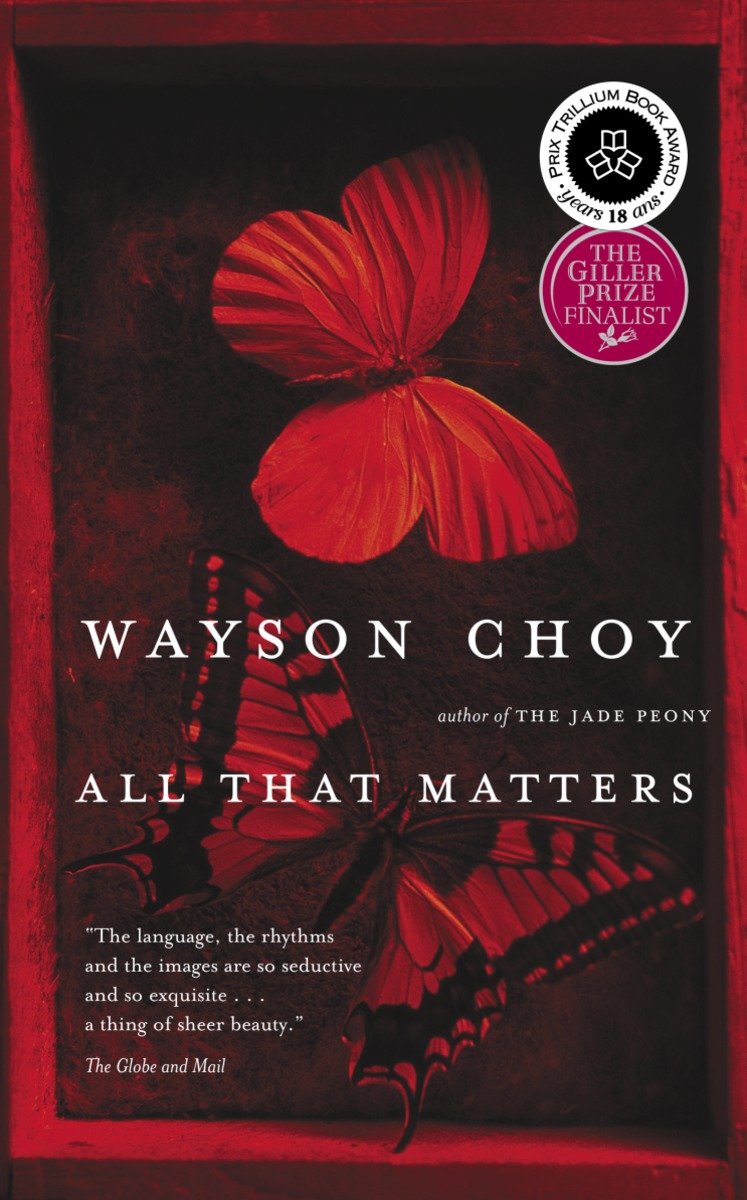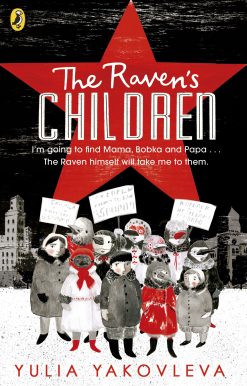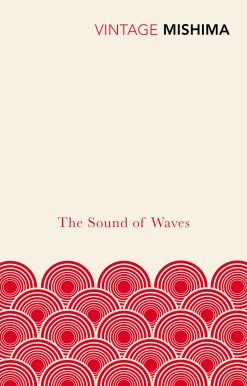All That Matters
16.00 JOD
Please allow 2 – 5 weeks for delivery of this item
Description
Kiam-Kim is three years old when he arrives by ship at Gold Mountain with his father and his grandmother, Poh-Poh, the Old One. It is 1926, and because of famine and civil war in China, they have left their village in Toishan province to become the new family of Third Uncle, a wealthy businessman whose own wife and son are dead. The place known as Gold Mountain is Vancouver, Canada, and Third Uncle needs help in his large Chinatown warehouse. Canada’s 1923 Chinese Exclusion Act forces them, and many others, to use false documents, or ghost papers, to get past the ‘immigration demons’ and become Third Uncle’s Gold Mountain family.This is the beginning of All That Matters, the eagerly anticipated sequel to Wayson Choy’s bestselling first novel, The Jade Peony. The author takes us once again to the Vancouver of the 1930s and 1940s to follow the lives of the Chen family, this time through the experiences of First Son, Kiam-Kim, whose childhood and adolescence in a strict but caring Chinatown family is at once strange and familiar to us.Like many families around them, they must survive in unsavoury surroundings. Since the closing down of the railroad work camps, Chinatown is filled with unemployed labourers who live in poor rooming-houses. Sea winds fill the rooms with acrid smoke from the mills and refineries of False Creek, and freight trains shake their windows at night with noises the Old One says are dragons playing. Yet this is a land where the Chen family will not starve; where they will be able to keep a girl baby, and not sell her into servitude as was the Old One, whose back is scarred from whippings.In their new life, however, there is a constant struggle to balance the new Gold Mountain ideas with the old traditions and knowledge of China. Old One doesn’t like Kiam-Kim to speak English, and Kiam-Kim knows that to be without manners, without a sense of correct social ritual, is to bring dishonour to one’s family. Children who lose their ‘Chinese brains’ are called ‘bamboo stumps’ by the elders because of the hollow emptiness within, so Kiam-Kim must study hard at Chinese school as well as English school. He must help Poh-Poh to cook for her mahjong ladies, and her hard knuckles rap his head when he misbehaves.Although Poh-Poh urges him to stick with his own kind and not let non-Chinese ‘barbarians’ into the house, Kiam-Kim forges a lasting friendship with Jack O’Connor, the Irish boy next door. He also has a girlfriend, Jenny, daughter of one of the mahjong ladies who owns a corner grocery shop. Meanwhile, China is suffering during the Japanese invasion of Manchuria, and soon the whole world is at war. Boys at school are enlisting, and many Chinese have gone back to fight for the old country. Kiam-Kim wonders, “What world would we fight for?” Canada is his home, yet he knows that the new country does not want Chinese soldiers.The Jade Peony, was “a genuine contribution to history as well as fiction” according to author Margaret Drabble. It spent 26 weeks on the Globe and Mail bestseller list, shared the 1995 Trillium Award with Margaret Atwood, and won the Vancouver Book Award. Blending rich historical detail with powerful personal stories, All That Matters follows Kiam-Kim as he learns the responsibilities and rewards of family and community, as he approaches adulthood in a city much divided, and as he faces decisions about what truly matters in life. More than anything else, the novel is an exploration of his character. “I think all stories should arise organically from the characters’ definitions of the world,” says Wayson Choy, who believes that it is in the identification of reader with character that literature exists. “If you give details that ring true…that’s the meaning conveyed by good writing.”
Additional information
| Weight | 0.37228 kg |
|---|---|
| Dimensions | 2.8702 × 12.8016 × 20.2184 cm |
| by | |
| Format | Paperback |
| Language | |
| Pages | 432 |
| Publisher | |
| Year Published | 2005-6-28 |
| Imprint | |
| Publication City/Country | Canada |
| ISBN 10 | 0385257775 |
| About The Author | Born in 1939, Wayson Choy grew up the son of Chinese immigrants in Vancouver’s Chinatown. His father worked as a chef on a Canadian Pacific ship, and the young Wayson often accompanied his mother at evenings of mahjong. He watched Chinese opera, but wanted to be a cowboy.After attending the University of British Columbia, where he enrolled in its Creative Writing course, Wayson Choy left Vancouver and has lived in Toronto since 1962. He is Professor Emeritus of Humber College and is a faculty member of the Humber School for Writers; he taught English for thirty years until he retired in 2002. He has been a volunteer for community literacy projects and AIDS groups, and for three years was President of Cahoots Theatre Company. He was appointed a Companion of Frontier College in 2002.A teacher himself for many years, he acknowledges those who helped in his early writing days, such as Jacob Zilber who guided him towards writing a short story called “The Sound of Waves,” which was selected for inclusion by the Best American Short Stories in 1962. Others were Jan de Bruyn, one of the first editors of PRISM magazine, and the poet Earle Birney, who taught creative writing at UBC. “I haven’t searched out mentors; they have been a kind of gift to me.” Choy was already teaching when he enrolled once again in the Creative Writing course; this time he produced the short story “The Jade Peony,” which was first published in 1977 and would be anthologized many times before Choy was asked to develop it into a novel.The Jade Peony, Choy’s first novel, is narrated by Kiam-Kim’s three siblings — Sister Jook-Liang, Second Brother Jung-Sum and Third Brother Sekky — as they each grope for their own childhood identity within the Chen family in Vancouver’s Chinatown. Their stories tell of poverty and racism. Published to glowing reviews, it became a runaway bestseller in Canada, and was published in Australia, Germany and the United States, where it was selected as a notable book by the American Library Assocation.It was after doing a radio interview about the book in 1995 that Choy received an unexpected phone call from a woman who had once been his babysitter, with a stunning revelation. At the age of 56 he learned that he had been adopted as a child. The feelings and memories unleashed inspired his second book, Paper Shadows, a memoir of his Chinatown childhood, which the National Post called a “lovely, agile dance of memory.” It won the Edna Stabler Award for Creative Non-Fiction, and was shortlisted for the 1999 Governor General’s Award, the Charles Taylor Literary Nonfiction Prize and the Drainie-Taylor Biography Prize.Choy says, “I began writing the book as if it was going to be a light, entertaining read because I had a happy childhood, but the more I delved into the past, I realized that dark path of the ghetto, the racism, and the family sex life, and so on. So the book turned on me and let me see for the first time what Chinatown meant.” On the other hand, his love and understanding of his deceased parents grew deeper as he learned about them through his research and his writing. Secrets were discovered that his family were not able to share, such as what had happened to the false papers they probably were destroyed to avoid being deported.Research forms an important part of the evolution of Choy’s work, whether it takes the form of talking to older people about their memories or of looking through old documents and photographs in museums for historical context. However, the depth of feeling in All That Matters evolved from a profound source. While Choy was writing it, he had a severe asthma attack, leading to a coma, during which he had more than one heart attack. As he recovered, he gradually discovered how terrible it had been for his friends and family. Though he had seen loved ones die of AIDS or cancer or old age, this made him realize more about the power of simple acts of decency, and the “deeper level, of connection between people,” something he went on to explore in the novel. |
| Excerpt From Book | ~ B E G I N N I N G S ~When I hear the sea wind blowing through the streets of the city in the morning, I can still feel my father and the Old One — together — lifting me up to perch on the railing of a swaying deck; still feel the steady weight of Father’s palm braced against my chest and Poh-Poh’s thickly jacketed arm locked safely around my legs. I was three then, in 1926, but I can still recall their shouting in the morning chill, “Kiam-Kim, Kiam-Kim,” their voices thin against the blasts of salty wind, “Hai-lah Gim San! Look at Gold Mountain! Look!”I saw in the distance the mountain peaks, and my toes curled with excitement. As I pressed a hand over each small ear to dim the assault of squawking gulls, fragments of living sky swirled and plunged into the waste spewing from the ship’s belly, and the sun broke through.All at once, the world grew more immense and even stranger than I could ever have imagined; I ducked my head to one side and burrowed blindly into Poh-Poh’s jacket. Father plucked me off the rail and put me down to stand up by myself.Poh-Poh did not stop him.“We are near Gold Mountain,” she said, her Toishan words shouted above other excited voices. “Straighten up, Kiam-Kim!”I watched as Father clutched the rail to hold our place against the surging crowd: he looked ready for anything.I put my own hands around the middle rail and threw my head back, and tried to look as bold and as unafraid as Father. Poh-Poh glanced behind her. A wrinkled hand shakily held on to my shoulder. I shouted to her to look at the swooping gulls, but she did not hear me.As the prow rose and crashed, and the Empress of Japan surged into the narrow inlet, gusts of bitter wind stung my eyes. At last, to greet the approaching Vancouver skyline, the ship blasted its horn.“Look there, Kiam-Kim!” shouted Father. “Way over there!”I looked: along a mountain slope, a black line was snaking its way towards the city.“See?” Father said, kneeling down to shout above the chaotic machinery clanking away in the ship’s belly. “I told you there would be trains.”I laughed and jumped about until the sea air chilled my cheeks. The Old One bent down to lift a thick coat collar around my neck. The air tasted of burning coal.“Listen carefully, Kiam-Kim,” Father said. “Can you make out the train whistle?”I listened. But I was not thinking of trains.Grandmother had told me the story that dragons screeched and steamed out of hidden mountain lairs: sweating, scaly dragons whose curving bodies plunged into the sea and caused the waters to boil and the wind to scorch the faces of intruders until their eyes, unable to turn away, burned with tears.The wailing finally reached my ears. The black line turned into freight cars headed towards the city’s row of warehouses and jutting docks.The train engine gave another shriek.In response, the ship blew its horn again. A shawl of sea birds lifted skyward. Ship and train were racing to reach the same point of land. People behind us applauded.Father raised his hand to shield his eyes against the dancing sunlight.“We’re here, Mother,” Father said to Poh-Poh.I said to myself, “ . . . here . . . ,” and gripped the rail even harder.The long train now disappeared behind a shoreline of low buildings. With my eyes following the great billows of smoke, I heard clearly the echoing screech of wheels.“The cries of a dragon,” said Poh-Poh.Father said, “Just the train coming to a stop, Kiam-Kim.”But the Old One’s voice was so certain that I held my breath.~ O N E ~When I was three years old, Father, Poh-Poh, and I were sent away from our Toishan village to Hong Kong, sent away by the Patriarch Chen, who was recently a Mission House convert and the head of our clan. As a demonstration of his Christian charity, the old Patriarch had agreed to clear the way for Third Uncle to sponsor us to come to Canada, so that Father, Grandmother, and I, First Son, would have a chance to escape the famine and the civil wars raging in the Pearl River Delta of Kwantung province. Those who could leave Sze-yup, the Four County village district in Southern China, would have a chance for a better existence. Those who settled in Gold Mountain might find work and send back remittances to help the ones left behind; every sojourner would return home when life improved in China.Much later, I learned that before he had put up the money and bought the documents for us to join him in Vancouver, Third Uncle had to consider the feelings of his dead wife. He consulted Chinatown’s Madame Jing, who set up her fortune-telling table in Market Alley and had known him since he first arrived in Gold Mountain. She interpreted the final toss of the I Ching coins.“The spirit of your dead wife approves,” she said.Soon after this sign of approval, American gold and large Mexican silver coins were paid into various hands. Six months later, we sailed on an Empress steamer and landed in Victoria, then headed to Vancouver to settle in the Chinatown rooms that Third Uncle had rented for the three of us in a building on East Pender Street, just half a block from his warehouses on Shanghai Alley.Third Uncle was not my father’s brother. In fact, he was a very distant cousin from Sze-yup, connected to us only through our mutual clan name of Chen; his own blood brother had died years ago in the interior of British Columbia. Over fifty, and successful as an import-export warehousing merchant, Third Uncle had been shocked into acknowledging his own mortality. In less than a month, five of his Chinatown associates had died, two from heart attacks, two from the coughing sickness, and one from a stomach tumour. He confronted a chilling fact: he had no family members in Gold Mountain to carry on after him. What legacy, then, had thirty years of his work and investments built? He promptly decided to sponsor a “namesake family” from Old China, a maaih-gee ga-ting, a “bought-paper family” that would replace what he himself had tragically lost. |
Only logged in customers who have purchased this product may leave a review.






Reviews
There are no reviews yet.